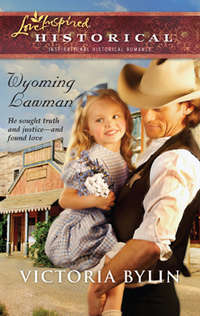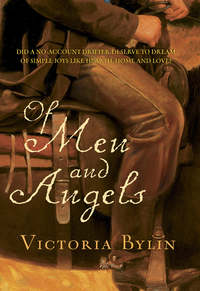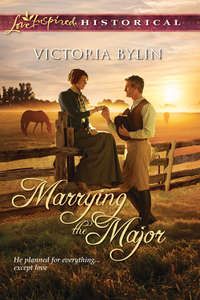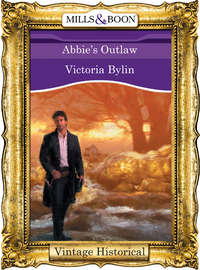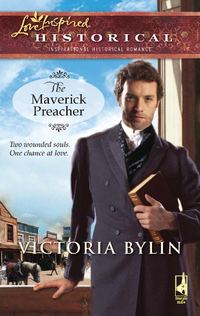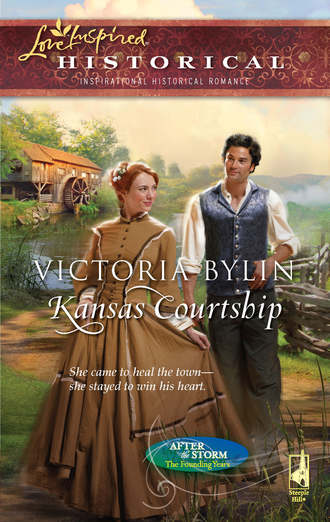
Полная версия
Kansas Courtship
“Be with me, Lord,” she said out loud. “I belong here. I know it. Amen.”
Strengthened, she hung the flour-sack towel on the windowsill to dry. The opening had no glass, only two shutters spread wide to let in the light. To the right she saw the backs of the buildings on Main Street. Below her, she saw Mr. Crandall driving his empty wagon to the livery stable. As he rattled past her window, he tipped his hat to a man coming out of a low building with a new roof.
Squinting against the sun, Nora recognized Zeb Garrison and his flashy vest. The man acknowledged Mr. Crandall with a stern wave, then removed his hat and wiped his brow with his sleeve, not stopping for a moment. From the vantage point of the window, she saw the crown of his head. No bald spot there…just thick hair that needed trimming. Everything about this man, even his hair, was bold, strong and defiant.
A smile played across her lips. She had the same traits. She also had an unshakable faith in God. As long as she stuck to her principles, she’d be safe from prejudice and cruel words. She’d treat Mr. Garrison the way she wanted to be treated. The Bible said to do unto others as you would have it done to you. That’s what she’d do now.
When Mr. Garrison threw stones, she’d duck.
When he criticized her, she’d smile.
When he mocked her, she’d turn the other cheek.
Nora knew all about loving her enemies. She also knew some enemies were more challenging than others. Mr. Garrison, she feared, would be the most challenging of all. With a prayer on her lips, she lifted the porkpie hat from her medical bag, pinned it in place and went to meet him in the parlor.
Chapter Three
Zeb caught a whiff of lavender. He hated lavender. It reminded him of Frannie.
He’d been staring out the parlor window, thinking about all the work he had to do, when the scent reached his nose. Turning, he saw Dr. Mitchell in the doorway. Instead of the duster that made her look like a farm girl, she wore a green dress with fancy sleeves and a hat with a silly feather. He dipped his chin. “Good afternoon, Dr. Mitchell.”
“Good afternoon, Mr. Garrison.” Striding forward, she offered her hand. “It’s a pleasure to meet you, again.”
“Once was enough for me.”
She kept her hand extended. “I’m hoping we can start fresh.”
Zeb smirked. “You can’t unring a bell, Dr. Mitchell.”
“No,” she countered. “But you can ring it again if it strikes the wrong note.”
She stood with her hand loose and ready, wearing a look that dared him to be civil. The moment called for formal manners, the ones he’d learned in Boston, except Zeb didn’t want to be civil. He wanted to fan the air to get rid of her feminine scent. He answered her by indicating a chair. “Please, sit down.”
Without a hint of defeat, she lowered her hand and sat on the sofa. Zeb dropped into a chair across from her, draped a boot over his knee and steepled his fingers. Her chin went up a notch. His went down.
If she wanted an interview, he’d give her one. “Tell me, Dr. Mitchell. Why do you want to practice medicine in High Plains?”
She smiled, but Zeb refused to be disarmed. Never mind her red hair and a dress that showed off her curves. She was female and not fit to practice medicine. She also smelled like Frannie. The scent brought back a rush of memories that gave him a headache.
Dr. Mitchell laced her gloved fingers in her lap. “Thank you for using my title. Most people—”
“You’re a doctor, aren’t you?”
“Of course.”
“Then that’s what I’ll call you.”
He expected her to bristle at his tone. Instead, her eyes met his with a patience beyond her years. “Shall we skip the pleasantries and get down to business?”
“Absolutely.”
“In the past year, I’ve applied for fourteen positions and been turned down fourteen times because of my gender. I’ve come to High Plains for a chance to prove myself. Will you give it to me, Mr. Garrison?”
Coming from a woman, the directness surprised him. “Why should I?”
“Because Dr. Dempsey is deceased, and I have the skills to replace him.”
Again, she’d been blunt. Zeb liked her style, but nothing could change her unsuitability. Whether she wanted to admit it or not, being female caused problems—including one he was about to introduce.
“Suppose I give you this chance.” He tapped his index fingers together. “What will you do for an office?”
“I’ll use Dr. Dempsey’s.”
“I don’t think so, Miss—Dr. Mitchell.”
“Why not?”
“Doc’s office was damaged in the tornado. After the storm he used a room in the church.”
She folded her hands in her lap. “A room at the church would do nicely.”
“It wasn’t exactly a room,” Zeb said dryly. “It was more of a closet. Besides, a family took it over the day Doc died. We’re that short of space.”
“I see.” Her eyes dimmed, but nothing else betrayed her surprise. “You must have had plans for the new physician. Whatever you arranged will be fine.”
“I don’t think so, Dr. Mitchell.” Zeb didn’t bother to hide a smirk. “I had planned to invite the new doctor to use part of my house for his practice. The offer was to include room and board in my home.”
Zeb expected a gasp at the news, maybe hysterics or a fluttering hankie. Dr. Mitchell said nothing for a solid minute, then she stood up. “We obviously need an alternative. I’d like to see Dr. Dempsey’s office.”
Zeb stayed seated. “Forget it. I wouldn’t let a dog live there.”
“I’m not a helpless pet,” she countered. “I’m a capable woman who can adapt to harsh conditions. If the building has four walls and a roof, I’ll manage.”
“It has four walls,” he said, pushing to his feet, “but I can’t promise you a roof.”
Doubt flickered across her face. He’d won a small victory, but he didn’t feel good about it. Zeb knew the pain of a dying dream. That’s what he saw on the lady doctor’s face.
In spite of worry in her eyes, she squared her shoulders. “I’d like to see it for myself.”
“We’ll go now, but I warn you. It’s been damaged.”
When she stepped into the entry hall, he passed her with the intention of holding the door. If she’d been a man, he wouldn’t have bothered. Dr. Mitchell didn’t want to admit it, but her gender mattered. Zeb didn’t view women as less intelligent than men. His mother had been as sharp as a whipsaw. Cassandra could play him like a fiddle. As for Frannie, she’d owned his every thought. He’d have died for her, but she’d gone to Paris alone to prove a point.
Zeb wondered if Dr. Mitchell was one of those self-righteous women crowing about equality. What did equal mean anyway? Men and women were different. Any fool could see that…especially a fool looking at Dr. Mitchell in her green dress.
As she passed through the door, the feather on her hat swished by his nose. He found himself taking long strides to keep up with her, watching as she looked across the road to the church. With the sun high and bright, the siding glistened white and the windows turned to silver.
“It’s a lovely church,” she said. “It’s a miracle it survived.”
“Blind luck is more like it.”
She tipped her face up to his. “You don’t believe in miracles, Mr. Garrison?”
“No, I don’t.”
“Neither do I,” she countered. “Not exactly.”
He wanted to know what she meant, but refused to ask. If the survival of the church counted as a miracle, what would she call the tragedy of the missing children? Zeb called it cruel. He’d prayed as a boy, but he didn’t believe in God like Will did. Will’s faith gave him confidence in bleak times, even joy. Zeb had no such foundation.
The dust stirred as they approached Doc’s office. Zeb stopped in front of it, pausing to let her take in the boarded-up windows and chinks in the siding from flying debris. The roof had a hole the size of a wagon, but he expected the walls to hold. The door, half off its hinges, hung like a broken arm.
He indicated the entrance with his chin. “There it is.”
“My goodness.” Her voice wobbled.
Good, he thought. Maybe she’d leave with the Crandalls. Leaving him back where he’d started with his doctor search. What would he do if someone broke an arm? And Bess Carter…the girl hadn’t said a word since the storm. Zeb recalled the tornado and how Will had rescued Emmeline Carter and her family, including her fifteen-year-old sister who’d been struck mute after losing the twins. No one knew why Bess couldn’t talk, and Doc Dempsey hadn’t been able to help her.
“May I go inside?” Dr. Mitchell asked.
“Be my guest.” Zeb shoved the door wide and waited for her to pass. Along with lavender, he smelled rot from the building. The fan of light revealed stains on the floor from rain coming through the window, and no one had swept up the broken apothecary jars. The shards, a mix of green, brown and gold, caught the light and glittered like fallen leaves.
Dr. Mitchell surveyed every corner with a keen eye. “It’s a mess.”
“That’s a fact.”
She looked at the empty shelves, then peered into the back rooms. “I don’t see anything that can’t be fixed with a mop and a scrub bucket.”
“You haven’t seen the roof.”
She looked up the stairs. “How bad is it?”
“Bad enough.”
“I’d like to see it.”
“Suit yourself, but I’ve wasted enough time for today. I won’t hire you.”
Zeb felt bad, but the townspeople would have to understand. No way could he have a female doctor working in his parlor. As for finding another place, he’d already tried and found nothing suitable. He shook his head. “Give up, Miss Mitchell. This isn’t going to work.”
Her eyes filled with cool disdain. “It’s Dr. Mitchell, and I never give up.”
“There’s always a first time.”
“This isn’t it,” she replied. “I have an offer for you. Will you listen?”
“Sure.”
“Hire me for one month. I’ll find an office, but I expect the town to pay for it. As far as room and board, I’ll stay at the boardinghouse. I’d like the cost to be included in our agreement.”
Pete had suggested the same thing. “Sure, why not?” Zeb said generously. She’d never find an office in High Plains. With those terms, she’d be gone in a week, and he could truthfully tell Pete she hadn’t worked out. Tonight he’d write another ad for the Kansas Gazette. The Crandalls could take it with the letters waiting at the mercantile.
Suspicion clouded her eyes. “That was too easy.”
“I’m giving you that chance you wanted.” He planted his boots wide and crossed his arms. If she wanted to act like a man, he’d treat her like one. “Name your price.”
“Twelve dollars a week,” she said boldly. “Plus room and board.”
She’d named a high price, expecting to negotiate. Zeb was glad to oblige. “I’ll pay you five. That includes room and board.”
“That’s insulting.”
“Yep.”
He wanted to rile her, but she didn’t blink. “This town needs a doctor, Mr. Garrison. You can’t afford to turn me down. Make it ten dollars a week, including room and board, and you have a deal.”
She had a point about the town’s need. Dr. Dempsey’s passing left him with a bad choice—a woman doctor or no doctor at all. For a few weeks, he’d have to tolerate her. “Fine, Dr. Mitchell. Ten dollars a week, it is.”
“Then it’s settled.” She came forward with her hand outstretched to shake on the deal. Again she met his gaze, demanding his respect and daring him to deny it.
Looking down at the beige glove, he saw the lace covering her fingers and the silky ribbon tied at her wrist. This wasn’t a man-to-man agreement. If he shook her hand, he’d notice the shape of her fingers, the warmth of her palm inside the lace. He didn’t want to touch her, but she’d win if he didn’t accept the gesture.
Annoyed, he gripped her fingers, but didn’t squeeze the way he would have shaken a man’s hand. Her bones felt too delicate for a show of strength. Neither could he ignore the scent of lavender.
Dr. Mitchell had no qualms about squeezing his hand. Those delicate bones had been deceptive. The woman had an iron grip.
She smiled at him. “You won’t be sorry, Mr. Garrison.”
He already was, but he kept the thought to himself.
Her eyes sparked with determination. “It won’t be easy. I’m well aware of the prejudice I’ll encounter.”
“Is that so?”
“Absolutely.” Her gaze hardened into blue glass. “You’re not the first man to ruffle my skirts.”
He couldn’t stop himself from looking her up and down. Pretty. Proud. And as stubborn as winter. He’d heard enough of her smart talk. “Let me be frank, Dr. Mitchell. I wouldn’t hire you if I had a choice. In the past year, four men interviewed for the position. Not one of them worked out.”
She raised one brow. “Let me guess. Patent medicines for sale?”
“Maybe.” He didn’t appreciate her tone.
“Did anyone bring leeches?”
He shuddered.
“I’m not surprised.” Her voice leveled into friendly banter. “Medicine is changing fast. Twenty years from now, my skills will be considered primitive, but right now I’m among the most highly trained physicians in America.”
“You’re also female.”
“That’s irrelevant.”
“Maybe to you. Not to me.” He put his hands on his hips and stared hard.
The lady doctor stared back, reminding him of the woman in the duster. She’d been all female when she’d smiled a greeting, and he’d liked what he’d seen. He liked her now, too. If it wasn’t for her medical degree, he’d have invited her to supper, maybe taken her on a buggy ride along the river.
She tipped her head to the side. “Tell me, Mr. Garrison. What worries you the most about hiring a female physician?”
“Everything.”
“That’s not an answer.”
“All right.” He thought for a second. “Women are tender-hearted. If a man gets his hand cut off at the mill, you’ll faint.”
“No, I won’t,” she said with a casual wave. “I’ve performed autopsies. They’re gruesome but necessary.”
Zeb’s stomach recoiled. He took another approach. “You’re from back East, a big city with streets and shops. Life is harsh in High Plains. I don’t think you can handle it.”
“I did fine with the Crandalls.”
He snorted. “It didn’t even rain. What about winter? A blizzard can last a week. The snow’s so deep—”
“I’m from New York,” she said impatiently. “I know what snow looks like.”
She had no cause to be irritated. He was trying to warn her, to prepare her for hardships unique to Kansas. “Then tell me, Dr. Mitchell. Have you ever seen a tornado?”
Memories came at him in a roar. Knowing she’d see the upset in his eyes, he strode to the broken window and looked at the sky. He relived the wind buffeting the mill, and hail beating on the roof. He recalled running to town and seeing the wreckage. He’d almost died that day. Others had died. He pictured the missing children and felt wretched. He thought of Bess Carter all tongue-tied from what she’d seen.
He heard footsteps on the floor, the swish of skirts. An instant later, Dr. Mitchell laid a gentle hand on his bicep. The touch took his breath as the tornado had done. His muscles clenched beneath her long fingers. Whether from anger or awareness, he couldn’t say.
She spoke in a hush. “I want you to know, Mr. Garrison, I’m sorry for what you’ve lost. The Crandalls told me about Mikey and Missy. They showed me the spot and we prayed—”
“A waste of time.”
“I disagree.” She lowered her hand, but her words hung between them. “God brought me here to serve this town. You can growl all you want—”
“I don’t growl.”
“Fine,” she argued with a smile. “You can grumble, then. But there’s nothing you can do to chase me back to New York.”
“Is that a dare, Miss—” He cocked one brow. “I mean, Dr. Mitchell?”
“No,” she said. “It’s a fact. I’ve been tested by male arrogance every day for three years. Compared to some of the men I’ve dealt with, you’ve been a tea party.”
Zeb had been called a lot of names in his life, but tea party wasn’t one of them. He didn’t care for the comparison, either. He’d been harsh because he wanted her to leave. “Life here isn’t a party, Doc. If Dr. Dempsey hadn’t passed on, you’d be leaving with the Crandalls.”
“But I’m not, am I?”
“You should be.” His voice rose with irritation. “You tricked me by using your initial instead of your real name.”
“You tricked yourself,” she said mildly. “You jumped to a conclusion.”
“A logical one.”
“A biased one,” she countered.
“You knew I’d think you were male.”
“You’re right.” She wrinkled her nose like a little girl. “I apologize.”
She looked downright cute. Zeb wanted to kiss her. The thought made him crazy. What was he thinking? She was an uppity know-it-all woman like Frannie. She had too much education and too much ambition. The next woman he kissed would be his future wife, either Winnie or Abigail, whichever one annoyed him the least. Dr. Mitchell annoyed him the most. “You’re hired for one month. Make it work or get out.”
“I’ll make it work.” She meant it. He heard the fight in her voice.
Zeb headed for the door. He couldn’t get back to the mill quick enough.
“Mr. Garrison!”
He stopped and faced her. “What is it?”
She looked into his eyes, staring hard as if she expected him to read her thoughts. Oddly, he could. She’d traveled a thousand miles and had arrived to a disaster. He hadn’t offered her a meal, even a cup of water. He’d been a jerk and they both knew it.
She spoke in a gentle tone that shamed him more than sarcasm. “Tell me, Mr. Garrison. Are you always this mean?”
“You bet I am.” Determined to have the last word, he walked out the door, leaving Dr. Mitchell adrift in the sea of broken glass.
Chapter Four
Nora hugged her waist and shivered, but not from a chill.
She shouldn’t have touched Zeb Garrison’s arm, but she’d seen the trauma in his eyes when he’d spoken of the tornado. When he turned to the window, she’d felt compelled to comfort him. She didn’t know about tornadoes, but she understood suffering. She wanted to dislike Mr. Garrison for his arrogance, but that moment had peeled back his bitter facade and revealed a genuine concern for High Plains.
“Not that genuine,” she said out loud.
She hadn’t been fooled by his acceptance of her offer. He’d agreed to the one-month trial out of desperation, and because he didn’t think she could find a suitable office. Like most men, he’d underestimated her.
So far, she hadn’t seen anything that couldn’t be fixed. The cracked windows could be tolerated, and she could scrub away the dirt. The broken apothecary jars could be swept into a bin, and she could wax the floor herself. Nora glanced at the ceiling. He’d told her the roof had a hole, but he hadn’t said how big it was. Considering his eagerness to get rid of her, he’d probably exaggerated the damage. If necessary, she’d put on pants, climb a ladder and cover it with a tarp until she could hire someone to replace the shingles.
When that would be, she didn’t know. She had just enough money to get back to New York and didn’t want to use her emergency fund. Even if she found a different office, she couldn’t afford the rent. The salary she’d negotiated would pay her living expenses, but money would be tight until she had patients. Everything depended on the condition of the roof.
Something rattled on the second floor. She looked up and saw a huge watermark. Her heart sank, but she refused to give up hope. The size of the stain didn’t have to match the size of the hole. Rainwater could have puddled and spread. She had to make this office work. If she didn’t succeed in High Plains, she’d end up back in New York married to Albert Bowers.
She walked to the stairs and started to climb. As the risers creaked, she heard the chirp of birds. The twittering reminded her of a truth she’d almost forgotten. The Lord had His eye on the sparrow. He knew every hair on her head. Surely He’d provide for her.
Hope welled in her chest, but so did fear. Had she been crazy to think the Lord had led her to this place? Had she been too prideful to listen to her father? Fear dragged her down the road that started with her brother’s death. She’d been so sure God had called her to heal. She’d fought to go to medical college. She’d prayed. She’d worked. Most of all, she’d trusted.
Alone in this dirty building, she felt her faith withering like a drought-stricken vine.
The chirping intensified into a symphony of sorts. Nora whispered a prayer. “I need Your help, Lord.”
Peering up the stairs, she made a decision. If she could cover the hole with a tarpaulin, she’d stay. If it was beyond repair, she’d consider going back with the Crandalls.
She climbed the stairs slowly, gripping the railing because she didn’t trust the steps. She reached the first landing and looked up into darkness. A good sign, she decided. If the roof had been gaping, there’d be light. She climbed the second flight. It ended at a closed door that explained the darkness.
With a prayer on her lips, she opened the door and saw a shaft of light. A hundred birds took flight, funneling upward through a hole the size of a bathtub. The fluttering wings stole her breath, her dreams, and she burst into tears. She couldn’t do it. She could scrub and clean, but she couldn’t fix the roof.
She slid to her knees and wept. Zeb Garrison had won. Unless something happened, she’d be leaving High Plains with the Crandalls. With her face buried in her hands, she cried out in groans beyond words.
Why, Lord? Why did you bring me here?
Something birdlike touched her shoulder. Startled, she looked up and saw a girl with white-blond hair. She guessed her to be fifteen years old, a girl on the cusp of womanhood. The child didn’t speak, but her blue eyes shimmered with intelligence. In that silent exchange, Nora received more compassion than she’d experienced in months. Her tears didn’t shame her. This child understood and wanted to help her. Then the danger of their situation struck home, and Nora gasped. There were on the upper level of a storm-damaged building, standing on a floor that had been compromised further by water from a leaky roof. They needed to leave straightaway before one—or both—of them fell right through the floor. Nora took a deep breath and reminded herself to stay calm and not spook the girl.
Nora wiped her eyes. “Hi. I’m Dr. Nora.”
The girl nodded but didn’t speak. Perhaps she was deaf. Nora’s feet were tingling from a lack of blood, so she slid to a sitting position. “What’s your name?”
The girl didn’t answer.
“Can you hear me, or do you read lips?” Nora tried again.
The girl opened her mouth, then clamped it shut. She looked down at the floor then looked up at the sound of a bird chirping on the roof. Well, that answered that question.
“That’s good,” Nora said, encouraging her. “You can hear pretty sounds, like music and birds.”
The girl smiled at that, then tipped her head, as if to ask a question. Why are you here?
Instead of answering, Nora did a cursory assessment. The girl could hear, and seemed to want to speak. If she’d been born mute, the instinct to open her mouth to reply to a question wouldn’t be there. Her neck showed no sign of injury, an indication her vocal cords hadn’t been damaged. Without an apparent physical cause, Nora suspected her muteness had hysterical origins, perhaps related to the tornado. The pieces clicked into place. This was the girl the Crandalls had told her about.
“You’re Bess,” Nora said. “Bess Carter.” The girl—Bess—nodded.
“Are you in town with your sister?” The Crandalls had said that Bess’s sister Emmeline had married town cofounder Will Logan, and that they all lived on the Circle-L ranch, outside of town.
“I’d like to meet her.”
The girl shrugged as if to say okay, then pushed to her feet. Nora stood, too. “I’ll follow you.” And do her best to make sure Bess wasn’t injured on her way out of the rickety building.


